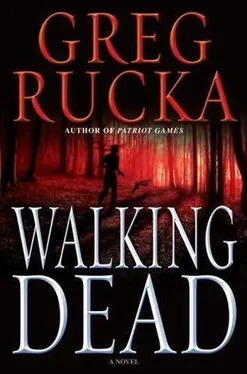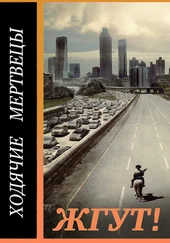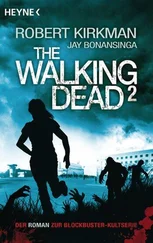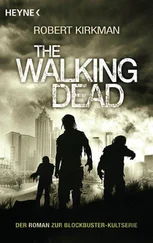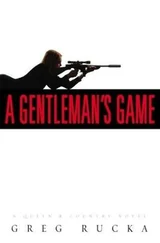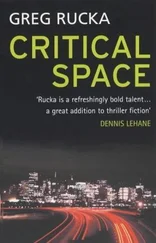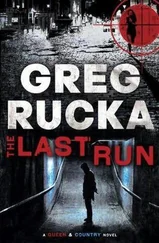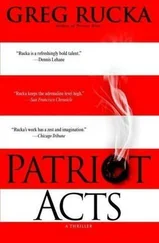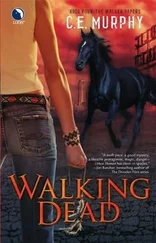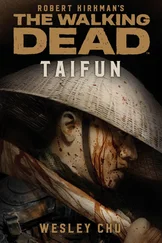Greg Rucka - Walking dead
Здесь есть возможность читать онлайн «Greg Rucka - Walking dead» весь текст электронной книги совершенно бесплатно (целиком полную версию без сокращений). В некоторых случаях можно слушать аудио, скачать через торрент в формате fb2 и присутствует краткое содержание. Жанр: Триллер, на английском языке. Описание произведения, (предисловие) а так же отзывы посетителей доступны на портале библиотеки ЛибКат.
- Название:Walking dead
- Автор:
- Жанр:
- Год:неизвестен
- ISBN:нет данных
- Рейтинг книги:4 / 5. Голосов: 1
-
Избранное:Добавить в избранное
- Отзывы:
-
Ваша оценка:
- 80
- 1
- 2
- 3
- 4
- 5
Walking dead: краткое содержание, описание и аннотация
Предлагаем к чтению аннотацию, описание, краткое содержание или предисловие (зависит от того, что написал сам автор книги «Walking dead»). Если вы не нашли необходимую информацию о книге — напишите в комментариях, мы постараемся отыскать её.
Walking dead — читать онлайн бесплатно полную книгу (весь текст) целиком
Ниже представлен текст книги, разбитый по страницам. Система сохранения места последней прочитанной страницы, позволяет с удобством читать онлайн бесплатно книгу «Walking dead», без необходимости каждый раз заново искать на чём Вы остановились. Поставьте закладку, и сможете в любой момент перейти на страницу, на которой закончили чтение.
Интервал:
Закладка:
Just your run-of-the-mill globe-trotting financial wizard, that was me.
The problem wasn't with the paper, per se, but with the itineraries. One-way tickets raise eyebrows amongst those who look for such things. While the passport that Nicholas Sargenti had supplied for Matthew Twigg had plenty of international travel attributed to it already, nowhere was there an entry stamp for Ireland. In and of itself, that wasn't extraordinary; most of the EU didn't bother for travel between member nations. But it was another anomaly, along with the one-way itinerary, and it made me nervous.
And sure enough, I was popped coming through customs in Newark.
"How long have you been away, Mr. Twigg?"
"Ten days," I said. "Had a deal to close in Dublin, then took a day to visit the Rock of Cashel."
He nodded slightly, flipping slowly through my passport beneath the purple glow of the blacklight by his terminal. There were plenty of ways he could determine that I was lying, but none of them were quick. Despite whatever efforts governments made to convince people of the contrary, his terminal didn't have a global database of travelers and their itineraries.
"They didn't stamp your entry," the agent said. "Next time you want to make sure they do, all right?"
"They didn't?"
"Nah, I'm not seeing it."
He marked my passport, whacked it with his stamp, and handed it back.
"Welcome home," he told me. I followed the connecting flight all the way through to SeaTac. It was after ten when I arrived, and I found myself a room at a budget hotel near the airport, booked myself on the earliest flight I could find the next morning to Las Vegas. I took a shower, careful to keep the stitches on my arm and side dry, which actually took some doing, and when I was finished, I felt like I still had a film of soap and sweat clinging to my body. I set the alarm on the BlackBerry to wake me with plenty of time for the flight, then killed the lights and lay on my back on the bed, with the television on low for company.
Theunis Mesick hadn't been able to give me much. He had been, he explained, the middleman. Arzu had handled the money, arranged the sales, as he had arranged the sale of Tiasa. Mesick's job had been to transport her from Trabzon and to take her, via Amsterdam, to the U.S. For doing this, Arzu had paid him almost twenty thousand euros. Mesick had been smart enough not to mention anything else he might have done with Tiasa, which had probably saved his life; if he'd confirmed what I suspected, that he, like all the men before him, had raped her, I'd likely have killed him then and there, and to hell with the rumblings of my conscience.
Mesick had simply been another link in the supply chain, and his information supported that. The only names he knew were Arzu's and Karataev's. He'd been given a phone number to use once he'd reached Las Vegas with Tiasa and told to call it using a prepaid cell phone. When he did, instead of a person, he always reached an answering machine. He would leave a message with the number of his phone, and within an hour of doing so would receive a text message telling him when and where to make the delivery.
It was a clean system, very difficult to trace back, and one that left nothing incriminating in its wake.
Mesick had been sincerely unable to remember the number, despite my threats, but it didn't really matter. The number he was told to call had never been the same one twice. Even had he been able to recall it, I was certain that all it would get me would be an out-of-service message. If the people on this end of the supply line weren't all using prepaid cell phones as well, they were fools. And I knew already that they weren't.
What Mesick had given me instead were directions to the drop site, where he'd brought Tiasa. Why he could recall that and not a phone number I didn't know, and it made me suspicious.
That Arzu had set me up by sending me to Mesick wasn't lost on me. Nor was the fact that I'd left both men alive. But Mesick was convinced Arzu was dead. Unless Arzu managed to buy himself out of lockup, there was no reason for Mesick to believe otherwise. And if I believed Mesick's information-and I didn't see much choice-then Mesick had no way of warning whoever had Tiasa that I was coming.
It wasn't ideal at all, but it was as close to a level playing field as I was likely to get. It was 101 degrees when I arrived in Las Vegas at eight in the morning. By the time I'd rented a car and checked into a hotel room well away from the Strip, it was ten, the mercury was kissing 108 and still climbing.
My rental had a Magellan GPS unit, and I used it, in conjunction with a newly purchased map, to plot myself a course out of town, heading northeast on Interstate 15. Vegas thinned, then dwindled, giving way to new developments peppering both sides of the highway, some of them left only partially constructed. The housing crash had clearly taken a boot to the nuts of Las Vegas.
Mesick hadn't had an address as much as a location, and with only his directions to go by, the doubt came gleefully creeping back as the Mojave Desert stretched itself out on all sides. After half an hour I passed the turnoff to the Valley of Fire Highway, and that was in keeping with what he'd told me. I stuck to the interstate as he had done, wondering what Tiasa had seen of the landscape, what she had made of this alien world. Wondering if she had been afraid still, or again, or if she'd felt nothing, turned numb by it all.
Some fifty miles out of Vegas, I turned off the highway, making south. Cropped buttes rose to the east and west as I continued away from the interstate. I began to see the first cautious indications of community again, faded road signs pointing me to places called Amber and Glassand. I even saw some green in the distance, where Lake Mead terminated into the Moapa Valley south of me, wresting fertile soil from the desert. Seeing the green would've given Tiasa hope, I thought.
But Mesick hadn't taken her that far.
A dirt road cut off the blacktop, heading east, and I followed it perhaps two hundred yards, the car leaving a cloud of dust in my wake. The road ended as insolently as it had begun, stopping without warning at two cinderblock buildings, each of them easily a sixth the size of the cottage I'd left in Ballygar. I stopped the car, letting the engine run, waiting to see if anyone would emerge from the structures. No one did. Neither of the buildings had windows that I could see. On the one furthest away, perhaps twenty meters, I saw a small satellite dish on the roof, and a compressor for an air conditioner.
I killed the engine and got out. It was furiously hot, as bad as Dubai, but devoid of even the barest humidity, the sunlight bright enough to hurt the eyes. I waited, listening, but there was no sound, nothing. Not wind, not traffic, nothing. I might as well have been standing in a vacuum.
The nearer of the two buildings, the one without the satellite dish, was unlocked. I pushed the door open, then stood in the doorway, waiting for my eyes to adjust. The stench of baked urine and shit washed out at me. I stepped inside, looking around, and quickly learned that there was almost nothing here to see. An empty plastic jerry can lay on its side by the door, and beside it a dented and weathered galvanized bucket. There were no fixtures, no sockets, and I doubted the building ever used power, let alone had been wired for it. I picked up the jerry can, stepped outside with it, trying to get fresh air, then uncapped it and gave it a sniff. There was no scent at all.
I looked back into the building, stomach churning, and no longer from the smell. It wasn't a building; it was a cell. That was probably how it was done. Mesick or someone like him would bring a girl to the location, lock her into the building, then retreat. There were literally hundreds of places in the surrounding terrain where someone could set up overwatch and never be seen. Lying in cover with a pair of binoculars and a bottle of Gatorade, the watcher would confirm the delivery, wait for however long they deemed prudent upon the trafficker's departure, and then move in for the pickup.
Читать дальшеИнтервал:
Закладка:
Похожие книги на «Walking dead»
Представляем Вашему вниманию похожие книги на «Walking dead» списком для выбора. Мы отобрали схожую по названию и смыслу литературу в надежде предоставить читателям больше вариантов отыскать новые, интересные, ещё непрочитанные произведения.
Обсуждение, отзывы о книге «Walking dead» и просто собственные мнения читателей. Оставьте ваши комментарии, напишите, что Вы думаете о произведении, его смысле или главных героях. Укажите что конкретно понравилось, а что нет, и почему Вы так считаете.
